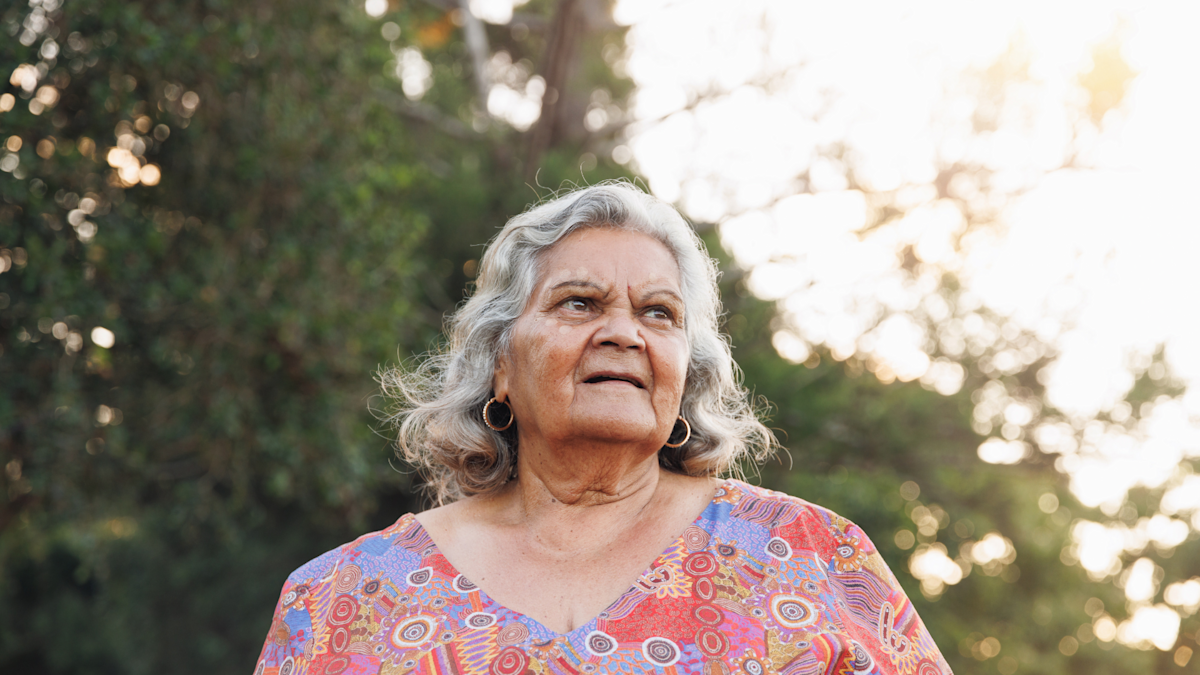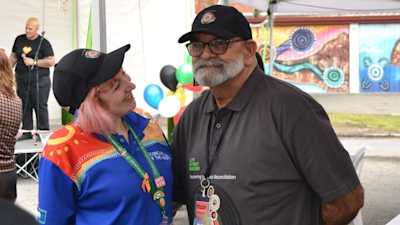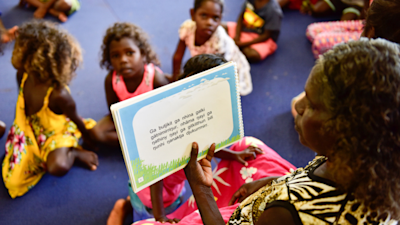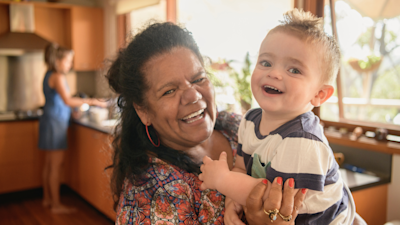National Apology Day calls us to reflect on the intergenerational impact of harmful and damaging government policies and act on our responsibility to heal and change the future for generations emerging.

Image: Close-up of an older woman with short grey hair, wearing a colourful top, standing outdoors and looking off to the side.
Aboriginal and Torres Strait Islander visitors are advised that this story discusses difficult topics. You can find a list of support resources at the end of this article.
What is the National Apology?
The National Apology, given by then Prime Minister Kevin Rudd in 2008, formally acknowledged the injustices of past Government policies and practices that forcibly removed multiple generations of Aboriginal and Torres Strait Islander children from their families, country and culture. It is a day to reflect on these past wrongs and consider how we might individually and collectively ensure the same wrongs don’t occur again.
Since colonisation, Aboriginal and Torres Strait Islander communities have experienced discrimination, unjust treatment, racism and abuse of their human rights. This treatment continued into the 19th and 20th centuries as a direct result of Government policies and society’s attitudes
The National Apology was a momentous turning point in Australia's history, demonstrating the importance of acknowledging past wrongs in paving the road to reconciliation in Australia.
Our greatest learning from the National Apology is how we put healing and reconciliation into practice. Life Without Barriers is steadfast in our reconciliation commitments and in our commitment to enable First Nations communities to thrive where children grow in culture, with kin and connected to country.
Steps we are taking now
National Partnership with SNAICC – a commitment to Transformation
Through our national partnership with SNAICC, Life Without Barriers is actively transitioning Frist Nations children in our care to community control across the country including restoring children to families wherever we can.
We have committed to, and continue to practice, supporting Aboriginal and Torres Strait Islander Community Controlled Organisations (ATSICCO) to lead service responses in their communities and working in community organisations, sector peers and Government to change the continuing policies which discriminate and impact the removal of children from their communities.
Our Partnership with Allies for Children
Life Without Barriers is a non-Indigenous organisation and some of the work we do includes supporting families in out of home care. First Nations children are over-represented in child protection systems and we know we are complicit in a system that needs changing.
Together with Act for Kids, Barnardos, Mackillop Family Services, Key Assets Australia and OzChild, we are working together to change ourselves with the guidance of First Nations leadership. Together, we are restoring children to families and communities, transitioning care arrangements to ATSICCO and ensuring we are not in competitive arrangements for services the community should be providing.
Our big focus is on changing the systems that lead to this over-representation.
Read here how this historic commitment amplifies support for self-determination and ATSICCO.

Image: Two adult women and three children walk across a sandy plain with their backs to the camera.
What is the difference between National Apology Day and National Sorry Day?
National Sorry Day, held on May 26, marks the anniversary of the tabling of the Bring Them Home report in Parliament which documented policies and practices that led to the removal of children. Australia recognises these children as part of the Stolen Generation.
National Apology Day is the anniversary of when the Apology was given by former Prime Minister Kevin Rudd. Australia continues to acknowledge National Apology Day as a reminder of the importance of recognition and truth-telling.

Image: A large group of people stand together outdoors. A woman in the middle is holding the Aboriginal flag.
Read the 'Close the Gap' report
You can visit the Closing the Gap website to read the annual Closing the Gap reports. Take some time to reflect on the steps Australia needs to take to close the gap and how you can help.
What is happening around Australia on National Apology Day?
Through hearing the stories of Stolen Generations survivors, all Australians can be part of the healing journey and help to shape solutions into the future.
In the lead up to, and on, National Apology Day, gatherings are scheduled around Australia with opportunities to yarn, share, and stand together as a community.
You can find an extensive list of events here.
If you or anyone you know needs help, know that it’s okay to reach out for support.
Aboriginal and Torres Strait Islander crisis support line 13YARN on 13 92 76
AIMhi-Y: An app to support the well-being of First Nations young people, aged 12-25
Beyond Blue on 1300 224 636
Brother to brother 24-hour crisis line on 1800 435 799
eSafety Commission's First Nations resources
Headspace on 1800 650 890
Kids Helpline on 1800 551 800
Lifeline on 13 11 14
MensLine Australia on 1300 789 978
Suicide Call Back Service on 1300 659 467
The National Indigenous Postvention Service – After Suicide Support 24/7 1800 805 801


